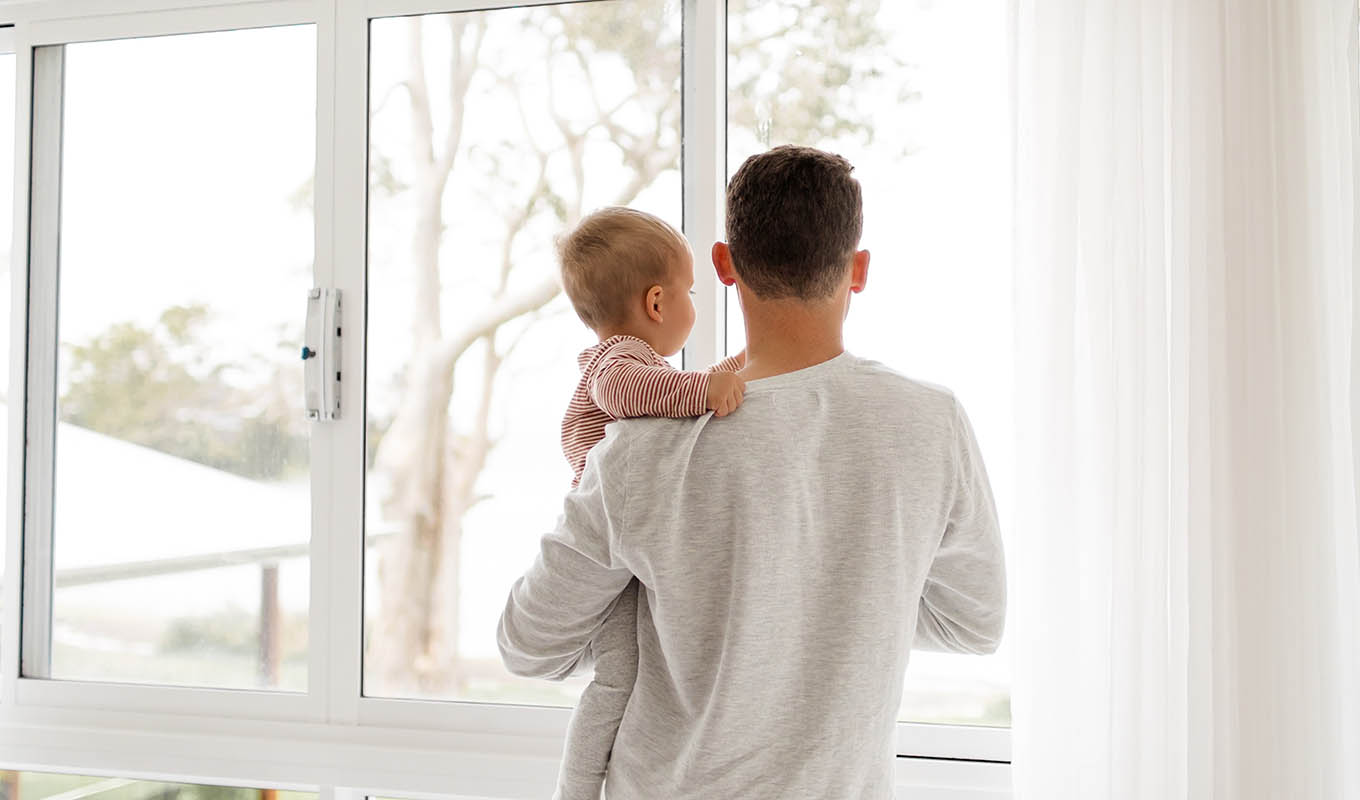Why Parenting Can Be Lonely, Even When You’re Rarely Alone

Lonely parents, particularly those who are parenting alone, may feel like they have to do everything on their own.
Key Takeaways:
- Loneliness in parents is more common than most people realize and those who are raising babies, teenagers, or any age in-between can struggle with it.
- 32% of new parents report loneliness, according to The Parenting Index, which is a global study on parenting that spans 16 countries.
- New parents who are raising children are juggling work and family obligations while learning how to parent, which can be an isolating experience.
Struggling with loneliness or having a mental health crisis?
- Suicide Prevention Lifeline: 1-800-273-TALK (8255); Deaf or hard of hearing dial 711 before the number or connect via online chat
I stood in the dark living room, swaying back and forth, desperate to ease my youngest child’s discomfort and tears.
Over those very colicky weeks, I perfected the art of three-in-the-morning rocking and swaying, keeping my eyes closed to pretend I was “resting” at the same time.
There was something precious about knowing only my arms and the motion of my body could soothe my sweet boy.
But it was also devastatingly lonely, too. Especially as my husband remained blissfully unaware, sleeping soundly in the next room.
It wasn’t the first or last time I would feel lonely as a parent.
7 Ways To Deal With Loneliness As A Parent

In the early days of parenting, I had great friends who had already raised their own children — and who pulled me out of isolation.
They babysat so I could go out. They planned excursions for “just us grown-ups” so I could spend time with them and be childfree for a little while.
Those friendships are precious to me. People who love me saw me struggling (or knew I would be eventually) and reached out to help.
Most importantly, though, I allowed them to help me. It made all the difference.
You can ask for — and accept — help whenever it is offered.
1. Remember you’re not alone:
Loneliness and isolation will try to convince you that you’re completely alone in the world. You’re the only one who feels this way and there’s no one to turn to.
Neither of those things is true.
Remember, a third of all parents — in the world — feel the same way you do. Think about that for a moment. It’s not a small number.
You’re not broken or a “bad” parent for feeling lonely. It’s completely normal, and you have more options than you realize.
2. Ask for what you need:
If you’re a two-parent home and you’re feeling alone in parenting, let your partner or co-parent know. We like to think our partners can read our minds, but they cannot.
It’s okay to ask for what you need and be very clear about it when you do.
“I want to go to my book club meeting this month. It’s important to me.”
Give your partner space to share their needs with you, as well. We can’t read their minds, either — so it’s important to check in with each other and ask for the things we need.
It’s a good idea to work out a system with each other where you each get to schedule time for non-parenting fun — whether alone or with friends.
3. Don’t hesitate to send that text:
Your social support network might only be a text message away. Regardless of what your lonely mind is trying to tell you, reaching out to others is worth the effort.
Even if it’s just a few minutes of light conversation or a couple of funny memes, that small dose of connection can help you feel less alone.
It’s okay to open up about what you’re feeling, too. If you need to talk to someone, let them know.
People aren’t always aware of when we’re struggling, especially if we have a habit of putting on a happy face and shouldering our burdens quietly.
Many of us do that.
You might not want to “bother” others with your struggles, or be seen as weak for struggling, or maybe you’ve just convinced yourself that you’ve got a handle on everything — or should.
And those around you have no idea you need help or support.
Your friends and family might also think that not hearing from you means you don’t need them.
So hit send and reach out.
4. Do it for your children:
We’re not fans of dad and mom guilt around here, but sometimes it’s easier to do something for our children than it is for ourselves.
This may be one of those times.
Studies have shown that while loneliness certainly impacts the mental health and well-being of parents, your loneliness could have an impact on your child’s health and well-being too.
To be the parent your children need you to be, you have to take care of yourself.
If you’ve ever flown in a plane, you’re familiar with the flight attendant bit about the oxygen masks — they always tell you that in the event of an emergency, secure YOUR mask first before helping anyone else.
Why? Because you can’t help anyone if you run out of air.
Taking care of yourself will allow you to take better care of your children. It’s hard to hear, but as a parent, there are going to be times (like this) when you’ve got to put yourself first.
5. Go out and seek out new fun:
Because loneliness often stems from not being able to easily connect with other adults, it’s important to find ways to make connections and remember that there is life beyond parenting.
Will you find your new BFF on your first outing? Probably not.
But if you never leave your house, you’ll never meet new friends, either.
Volunteer for a cause that means a lot to you. Take up a new hobby you always wanted to try. Join a local parent’s group, go to the gym, or try a new activity like biking or hiking.
The point is to leave your kids at home — with a babysitter if needed, of course — and go out into the world in search of new experiences or people.
Even the act of sitting in a coffee shop to enjoy dessert alone while in the company of the other patrons around you is enough to “remind” you of life beyond parenting.
When you’re constantly at home and with your children, it’s easy to forget that.
6. Remind yourself this won’t last forever:
The loneliness that comes with raising newborns doesn’t last forever because eventually, your children grow up.
The isolation and loneliness from constant caregiving subsides for most parents as their children become more independent. (Although this definitely isn’t true for all parents.)
Being lonely can feel like being stuck in a rut. You’re stuck in the house; stuck in a stage; stuck in life.
But it isn’t permanent.
As with most phases of life, this too shall pass. That’s a common phrase, but particularly as it applies to parenting, every phase will eventually pass.
Some of them last longer than others, but raising kids is like watching evolution advance before your very eyes.
It might not feel like it right now, but it’s always in motion, moving ever forward as time goes on.
The hardest parts of any phase become easier with acclimation.
(Although usually, by the time you settle into a groove with one phase, the next one arrives…welcome to parenthood.)
7. Seek professional help for loneliness — and its source:
You might need the help of a mental health professional to deal with your loneliness.
But you might also need the help and support of other professionals to help you navigate the source of your loneliness.
Struggling to breastfeed? Work with a lactation consultant who may be able to help — even if that comes as a reminder that bottle-feeding is okay, too.
Struggling as a caregiver to a disabled child? Find out what resources are available in your state or region. You may be entitled to extra support and help.
Additionally, groups like Parent To Parent USA or the Council For Exceptional Children provide many useful resources for caregivers and their children.
Sometimes our loneliness stems from going through difficult challenges alone.
There’s no shame in asking for help — from friends, family, or professionals.
There are so many different reasons why you may feel lonely as a parent but there are options to combat your loneliness.
You can get through this period in your life and connect (or reconnect) with people who care about you and can help.
Why Do Parents Experience Loneliness?

Loneliness tends to come from social isolation and a lack of meaningful relationships in our lives — specifically, not having the amount of interaction or connection with others that we desire.
This is especially true for parents.
Yes, we spend time with our children, and particularly when they’re young, we’re almost never physically alone, but that relationship doesn’t fulfill every need for connection we may have.
One of my lowest moments came as a single parent. At the time, I wondered if I would have been better off staying in a miserable marriage rather than raising my two boys all alone.
One child was sick, the other was having problems at school, and I had no one to turn to for help.
Shouldering the entire burden of parenting takes a toll.
Not only did I lose a second set of adult eyes and hands to help take care of my children, but I also lost the companionship of getting through tough moments together.
Ultimately, divorce was the best decision for our family, but transitioning to single parenthood was a lonely, stressful endeavor.
Parental loneliness can arise from a variety of situations:
- Navigating new parenthood
- Moving to a new location
- Not living near friends or family
- Caring for a child with disabilities
- Working from home while parenting
- Feeling unsure of your life’s direction
- Feeling like you’re parenting alone in a marriage
- Managing single parenthood or after divorce
- Not connecting with other adults regularly
- Feeling left out of non-parenting activities
- Feeling like you don’t fit into groups with other parents
- Losing touch with friends who don’t have children
Regardless of why you’re feeling lonely as a parent, you’re definitely not alone. In the UK, a third of parents report feeling lonely.
That’s true across the globe.
The Parenting Index, a study of parenting across 16 countries, shows that 32% of new parents report loneliness, even in the hyper-connected world we live in.
They know they can text or Facetime someone they care about but the loneliness persists.
Parenting requires changes to your pre-kid routines, learning how to handle the demands of raising a child, and losing the free time you once had available to spend among your adults-only social circles.
When you bring a newborn home — or even an older child you may have adopted — it’s not unusual to focus solely on both your child and the changes in your life as a new parent.
This is a time of learning how to parent your child. It’s also incredibly isolating for many people, especially when parenting alone or facing challenges that go beyond “simple” parenting.
For instance, children with disabilities need more time, attention, and resources from their parents. Instead of scheduling playdates where you can interact with other parents, you’re often scheduling doctor’s appointments.
Beyond that, living without friends and family nearby can be difficult for many parents, especially because they may be losing out on a support network that could help them feel less alone.
But even if your friends are right next door, it’s not always easy to foster or maintain social relationships after becoming a parent — it takes a considerable amount of effort.
Friends who are raising children themselves are equally busy juggling work and family obligations, and those without children may engage in social activities scheduled during your child’s after-school activities, homework, or bedtime.
Loneliness is an understandable outcome.
Not only is the sense of isolation strong but you may feel like you’re the only parent in the world going through this. Trust me, you’re not.
Some unexpected parts of parenting can feel incredibly isolating, such as during the COVID-19 pandemic.
Not only were parents cut off from the outside world while taking care of their children as lockdowns began but the safety of everyone required more distance than ever before.
In a time of pandemics, social distancing, hybrid work schedules, and school closures, parents were forced to deal with a lot.
Parents suddenly working from home missed the interaction with colleagues and clients they may have been used to. Adding the stress of working and parenting simultaneously, it’s no wonder why loneliness became prevalent among parents during the pandemic.
As a parent, I don’t live close to family — who would love to spend as much time with my children as possible.
Even though they’re not physically close to me, I know I can call and connect with them at any point — whenever I need to.
But when you’re in the depths of loneliness, it’s hard to remember that you have that support system. The isolation causing your loneliness can convince you that you’re truly alone or have no one to turn to.
And that’s rarely true.
Feeling lonely as a parent is extremely common.
And it’s not just parents of newborns who experience loneliness.
It’s difficult to maintain old social ties and to build new ones, even though that’s exactly what you need to combat feeling alone as a parent.
Closing Thoughts
Parental loneliness is more common than most people realize and those who are raising babies, teenagers, or any age in-between struggle alike.
The good news is that you’re not alone, and you’re not powerless.
You can and will make it through this moment in life. You simply need help to reconnect, and there’s no shame in that.
Editor’s Note: This article is part of The Roots Of Loneliness Project, the first-of-its-kind resource that comprehensively explores the phenomenon of loneliness and over 100 types we might experience during our lives.
Find Help Now
If you’re struggling with parenthood loneliness, we’ve put together resources to meet you wherever you are — whether you want someone to talk to right now, or are looking for longer-term ways to help ease your loneliness.
- Suicide Prevention Lifeline: 1-800-273-TALK (8255); Deaf or hard of hearing dial 711 before the number or connect via online chat
- Resources & Emotional Support For Loneliness
- Volunteer & Pet Adoption Opportunities






